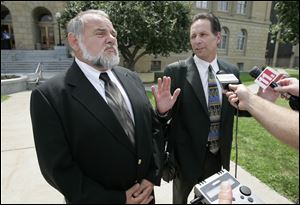
McCloskey’s legal fees considered
City Council asked to pick up $92,000 tab for ex-councilman
5/20/2013
With court rulings in the long-running corruption case of Bob McCloskey, left, apparently at an end, Toledo City Council is being asked to pay the fees of Jay Feldstein, right, the lawyer who represented former Councilman McCloskey.
With court rulings in the long-running Bob McCloskey corruption case apparently at an end, Toledo City Council is being asked to pay the fees of the lawyer who represented former Councilman McCloskey.
A legal tab of $92,000 would be paid to lawyer Jay Feldstein and his law firm of Kalniz, Iorio and Feldstein, for representing McCloskey in the civil case. The city did not pay for his criminal bribery representation.
Council is to discuss the ordinance in its agenda-review meeting Tuesday.
According to the ordinance, the city had to hire an outside lawyer to represent McCloskey because of a legal conflict between the city and the former East Toledo councilman.
The contract between Mr. Feldstein and the city was signed in 2004.
In early 2006, the city of Toledo notified McCloskey that it no longer would provide him with a defense and stopped paying legal fees, but Mr. Feldstein responded that his firm would continue to represent McCloskey and reserve its rights to later seek reimbursement.
“Given the amount of legal services provided over this time period that includes extensive discovery and motion practice in the District Court; complex appellate practice in the United States Court of Appeals, and briefing in the United States Supreme Court, the amount billed is reasonable,” according to the city law department.
The U.S. Supreme Court on March 25 denied a petition from a Michigan developer seeking to appeal the civil bribery case.
That came after the 6th U.S. Circuit Court of Appeals inlast September released an opinion affirming the lower court’s decision to dismiss.
McCloskey was criminally charged in both state and federal courts on bribery charges and served about 20 months of a 27-month federal prison sentence.
He was released in May, 2008.
EJS Properties LLC sued the city and McCloskey in 2004, alleging the city violated its constitutional rights to property, liberty, and due process when it denied EJS’s application for rezoning in East Toledo in 2002.
The Michigan company planned to buy part of the former Pilkington PLC technical research center complex and lease it to a charter school.
It said the rezoning application was defeated because then-Councilman McCloskey didn’t get a $100,000 payment he demanded, and council followed his lead. The money was to be for a Pilkington retiree prescription fund.
The city denied that council acted under McCloskey’s influence and contended the rezoning decision was based on valid reasons.
Judge Carr dismissed the city from the $10 million civil case in August, 2009, and dismissed the federal claims against McCloskey.
Toledo City Councilman D. Michael Collins, who leads the public safety, law, and criminal justice committee, said he would recommend approval of the legal bill because the city was also on the hook in the case.
“I am comfortable that the case, having traveled all the way up to the Supreme Court, is now resolved. It’s a very expensive lesson,” Mr. Collins said.
More than a year after denying EJS’ rezoning application, council voted to rezone the same property, plus additional acreage, for a junior high school and campus for Toledo Public Schools.
Judge Carr ruled that council denied the rezoning to EJS for a legitimate reason — to preserve industrially zoned land. But he said there was potential evidence McCloskey wrongly interfered in the business relationship between EJS and Pilkington.
The suit alleged that McCloskey, a Pilkington retiree, would have benefited personally and politically by the creation of a prescription drug fund for Pilkington retirees, though McCloskey denied it.
“On behalf of Bob, we're very happy that after nine years the case is concluded, and we’re very happy we prevailed,” Mr. Feldstein said.
He said the city’s position was that it would not have paid McCloskey’s legal bill if it was found that he violated EJS’s constitutional rights, which was a claim in the lawsuit.
Contact Tom Troy at: tomtroy@theblade.com or 419-724-6058.